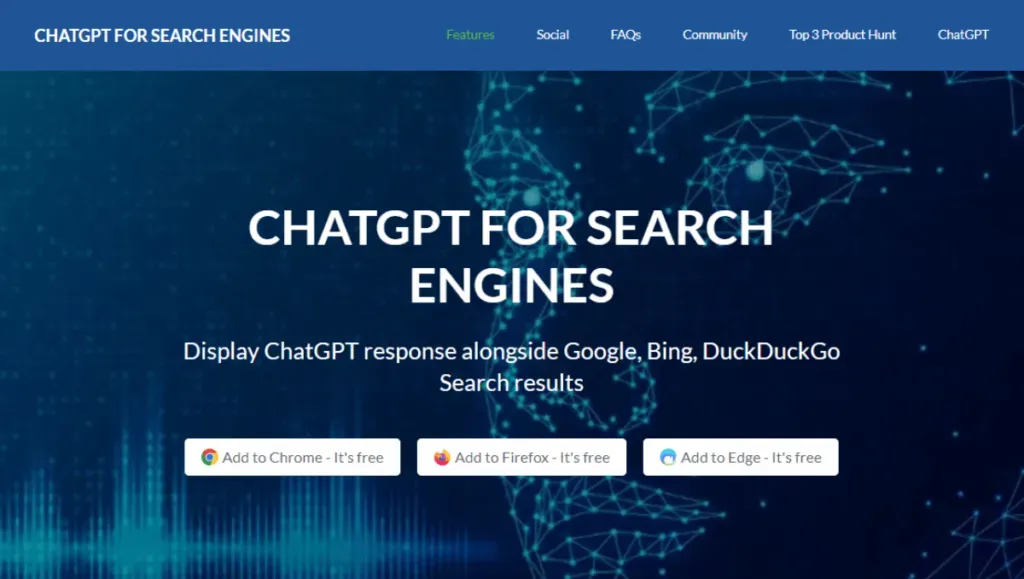ChatGPT Search is revolutionizing the way users access information online, making it more accessible than ever. With no sign-in required, this innovative tool from OpenAI allows users to tap into real-time information effortlessly. Unlike traditional search engines, ChatGPT Search offers a conversational interface powered by AI chatbots, providing tailored responses that eliminate the need to sift through endless results. As more people discover how to use ChatGPT Search, it raises the stakes for established players like Google and newer competitors like Perplexity. By integrating dynamic data retrieval with user-friendly functionality, ChatGPT Search is set to redefine the landscape of online searching.
The emergence of ChatGPT Search marks a significant shift in the realm of digital inquiries, as users now have a powerful tool at their fingertips. This advanced AI search capability enhances user experience by delivering precise and current results through a simple interface. With its ability to pull information from various sources in real-time, ChatGPT Search stands out among other AI-powered platforms. Understanding the distinctions between traditional search methods and this cutting-edge approach can help users maximize their online research efficiency. As the demand for immediate information grows, mastering the use of this AI-driven search option becomes increasingly valuable.
Understanding ChatGPT and ChatGPT Search
ChatGPT and ChatGPT Search serve distinct purposes within the realm of AI chatbots. ChatGPT is primarily designed for conversational interactions and is trained on a vast dataset, which enables it to respond to inquiries with well-structured answers. However, its functionality is limited to the information available up to its last training cutoff, making it less suitable for real-time inquiries. On the other hand, ChatGPT Search is engineered to tap into dynamic, real-time information, allowing users to fetch the latest updates on various topics such as current events, stock prices, and weather forecasts. This differentiation is crucial for users who need immediate answers and up-to-date data, showcasing how each tool caters to specific user needs in the AI landscape.
The emergence of ChatGPT Search marks a significant evolution in how users engage with AI technology. With its ability to provide real-time information, ChatGPT Search positions itself as a formidable competitor against traditional search engines like Google. The convenience of not requiring a sign-in process significantly lowers the barrier for entry, inviting more users to explore its capabilities. By offering a seamless experience, ChatGPT Search not only enhances user interaction but also challenges existing paradigms in online search, thereby reshaping the way information is accessed and consumed.
How to Use ChatGPT Search Effectively
Using ChatGPT Search is straightforward, making it accessible for users of all tech levels. To get started, simply navigate to ChatGPT.com and locate the ‘Search’ button within the prompt box. This intuitive interface allows users to enter queries effortlessly, whether they’re looking for the latest news or specific information. Once a search is initiated, results are displayed alongside source boxes that link to the original content, ensuring that users can verify the information provided. This aspect of the tool not only enhances credibility but also encourages users to delve deeper into topics of interest.
Moreover, the functionality of ChatGPT Search is enhanced by its ability to aggregate information from various sources. After receiving a response, users can click the ‘Sources’ button to view a comprehensive list of references. This feature is particularly beneficial for those conducting research or seeking detailed insights. The integration of source links allows ChatGPT Search to rival other search-focused AI chatbots like Perplexity, offering a well-rounded experience for users who prioritize accuracy and depth in their inquiries. By mastering the interface and features of ChatGPT Search, users can efficiently harness the power of real-time information.
ChatGPT vs ChatGPT Search: Key Differences
When comparing ChatGPT with ChatGPT Search, the differences are striking and cater to varying user needs. ChatGPT serves as a conversational agent, ideal for generating text, brainstorming ideas, or answering queries based on pre-existing knowledge. Its strength lies in its ability to engage users in dialogue, making it suitable for creative tasks and general inquiries. In contrast, ChatGPT Search is tailored for users who require immediate access to current data and information. This distinction is vital for users who depend on timely updates, such as news enthusiasts or professionals needing market data.
Another crucial difference is how each tool presents information. ChatGPT, while proficient in conversational AI, does not provide sources for its responses, which can sometimes lead to questions about the accuracy of the information. On the other hand, ChatGPT Search emphasizes transparency by listing sources alongside its results, allowing users to verify and explore the origins of the information. This feature not only enhances trustworthiness but also empowers users to conduct their own research more effectively. As the landscape of AI chatbots continues to evolve, understanding these differences will help users choose the right tool for their specific needs.
The Impact of ChatGPT Search on Traditional Search Engines
The introduction of ChatGPT Search represents a significant shift in the competitive landscape for online searches. Traditional search engines like Google have long dominated this space, providing users with a wealth of information but often requiring them to sift through numerous links to find relevant data. With its real-time information capabilities and user-friendly interface, ChatGPT Search is poised to challenge this status quo. By streamlining the search process and delivering precise answers, it not only enhances user experience but also puts pressure on established search engine giants to innovate further.
Moreover, as more users turn to AI chatbots for information, the expectations regarding speed, accuracy, and accessibility will inevitably rise. ChatGPT Search’s ability to deliver immediate results while maintaining transparency through source links sets a new standard for user interactions with information retrieval systems. Consequently, traditional search engines may need to adapt their strategies to retain their user base, potentially leading to enhancements in their algorithms and services. This evolution signifies the growing influence of AI technologies in everyday searches, reshaping how we access and interact with information online.
Enhancing User Experience with ChatGPT Search
User experience is at the forefront of ChatGPT Search’s design, making it an appealing option for those seeking quick and reliable information. The elimination of the sign-in requirement significantly enhances accessibility, inviting a broader audience to utilize the platform. This focus on user-friendly features ensures that even those who may not be tech-savvy can navigate the system effortlessly. By prioritizing ease of use, ChatGPT Search aims to deliver a seamless experience that encourages users to return for their informational needs.
In addition to its accessibility, ChatGPT Search’s real-time capabilities further enhance user satisfaction. Users can obtain the latest updates on a variety of topics, ensuring that they are always informed. This dynamic interaction not only saves time but also enriches the user’s knowledge base. The incorporation of source links adds another layer of engagement, allowing users to explore information more deeply. By addressing the key aspects of user experience, ChatGPT Search is set to become a go-to resource for individuals seeking immediate and trustworthy information.
Leveraging ChatGPT Search for Research Purposes
For researchers and students, ChatGPT Search can serve as a valuable tool for gathering information efficiently. Its capability to provide real-time data means that users can access the most current research findings, news articles, and academic papers without the hassle of navigating multiple websites. This centralized access to information not only streamlines the research process but also allows for a more organized approach to gathering relevant data. By entering specific queries, users can quickly compile a wealth of information, making it easier to formulate hypotheses or support arguments.
Furthermore, the ability to view sources enhances the credibility of the information obtained through ChatGPT Search. Researchers can easily verify the validity of their findings by checking the original sources, which is crucial in academic contexts where accuracy is paramount. This feature allows users to build a robust foundation for their work, ensuring that they are referencing credible and up-to-date information. As the field of research continues to evolve, leveraging AI technologies like ChatGPT Search will undoubtedly become an integral part of the investigative process.
The Future of AI Chatbots and Search Technologies
The future of AI chatbots and search technologies is poised for transformative changes, driven by innovations such as ChatGPT Search. As users increasingly demand real-time information and seamless interactions, AI systems will need to evolve to meet these expectations. The integration of advanced machine learning algorithms and natural language processing will enhance the capabilities of chatbots, enabling them to provide even more accurate and contextually relevant responses. This evolution will likely lead to a new era of AI-driven searches, where users can engage with information in a more conversational manner.
Moreover, the competitive landscape will continue to influence the development of AI chatbots. As tools like ChatGPT Search gain popularity, traditional search engines and other AI chatbots will be compelled to adapt their services to retain users. This could result in a range of enhancements, from improved algorithms to more user-centric features. The ongoing advancements in AI technology will not only redefine how information is accessed but also how users interact with digital platforms, paving the way for a future where AI plays an even more central role in our daily lives.
Exploring the Benefits of Real-Time Information
The ability to access real-time information through platforms like ChatGPT Search offers significant benefits for users. In an age where information is constantly changing, having a source that can provide the latest updates is invaluable. Whether for personal use, professional inquiries, or academic research, real-time information ensures that decisions are based on the most current data available. This capability is particularly beneficial in fields such as finance, where market trends can shift rapidly, or in journalism, where timely reporting is crucial.
Furthermore, real-time information fosters a more informed society. By enabling users to stay updated on various topics, ChatGPT Search encourages engagement with current events and developments. This heightened awareness can lead to more informed discussions and decisions among individuals, ultimately promoting a more knowledgeable public. As the demand for immediate access to information continues to grow, platforms that prioritize real-time data, like ChatGPT Search, will become essential tools for navigating the complexities of our fast-paced world.
Navigating Ethical Considerations in AI Search Technologies
As AI technologies like ChatGPT Search become more integrated into our daily lives, ethical considerations surrounding their use become increasingly important. Issues such as data privacy, misinformation, and the potential for bias in AI responses must be carefully navigated to ensure that these tools serve the public good. Users must be aware of the source of information provided by AI, as reliance on unverified sources can lead to the spread of false information. The transparency offered by ChatGPT Search, with its source linking feature, is a step in the right direction, but ongoing vigilance is necessary.
Additionally, the responsibility of developers to create ethical AI systems cannot be overstated. OpenAI and other organizations must prioritize fairness, accountability, and transparency in their AI systems to foster trust among users. As the landscape of AI continues to evolve, it is crucial to engage in discussions about the ethical implications of these technologies, ensuring that they are developed and used in ways that benefit society as a whole. By addressing these ethical considerations, we can harness the power of AI while minimizing potential risks.
Frequently Asked Questions
What’s the difference between ChatGPT and ChatGPT Search?
ChatGPT is a conversational AI chatbot that provides responses based on a fixed dataset, whereas ChatGPT Search offers real-time information and updates. ChatGPT is suitable for general inquiries and creative tasks, while ChatGPT Search is ideal for accessing the latest news, weather, and other dynamic content, complete with source links.
How can I use ChatGPT Search?
To use ChatGPT Search, visit ChatGPT.com and click the ‘Search’ button in the prompt box. Enter your query, and you will receive responses along with source citations. Clicking on these sources will take you to the original pages for more detailed information.
Is sign-in required for ChatGPT Search?
No, you no longer need to sign in to use ChatGPT Search. OpenAI has made it accessible to everyone without a sign-up requirement, enhancing user convenience.
What types of information can I obtain using ChatGPT Search?
ChatGPT Search allows you to access a variety of real-time information, including the latest news, stock prices, weather updates, and other time-sensitive data, making it a powerful tool for current events.
How does ChatGPT Search compare to other AI chatbots?
ChatGPT Search stands out from other AI chatbots like Perplexity by providing real-time information with source links, allowing users to verify and explore the information further, thus enhancing its reliability and utility.
Can ChatGPT Search provide sources for its information?
Yes, ChatGPT Search lists its sources along with the responses it generates. Users can click on these sources to access the original content for more detailed insights.
What are the benefits of using ChatGPT Search over traditional search engines?
Using ChatGPT Search can streamline your search experience by providing concise, conversational responses without sifting through numerous search results. It also presents information with sources for verification, enhancing trust and accuracy.
When was ChatGPT Search launched?
ChatGPT Search was launched in October 2024, marking a significant development in OpenAI’s efforts to provide real-time search capabilities through its AI technology.
How does ChatGPT Search enhance user productivity?
ChatGPT Search enhances user productivity by delivering quick, relevant answers and linking to sources, allowing users to gather information efficiently without extensive searching.
What additional features does OpenAI offer alongside ChatGPT Search?
OpenAI has introduced features like Operator, an AI agent for web tasks, and Deep Research, which autonomously conducts multi-step research, both designed to improve user productivity in various tasks.
| Key Point | Details |
|---|---|
| No Sign-In Required | Users can access ChatGPT Search directly without signing in, enhancing accessibility. |
| Difference from ChatGPT | ChatGPT Search provides real-time information and lists sources, unlike the regular ChatGPT. |
| Launch Date | ChatGPT Search was launched in October 2024. |
| Usage Instructions | Visit ChatGPT.com, click the ‘Search’ button, and enter your query. |
| Competitive Impact | ChatGPT Search increases competition for Google and other AI search bots. |
| Additional Features | Source links provided in responses for further information. |
Summary
ChatGPT Search is now accessible without the need for sign-in, making it easier than ever to utilize this powerful tool. This new feature enhances user engagement and represents a significant shift in the online search landscape, emphasizing the importance of real-time information and source transparency. With its launch in October 2024, ChatGPT Search not only competes with traditional search engines like Google but also challenges other AI chatbots. To use ChatGPT Search, simply visit ChatGPT.com and click the ‘Search’ button to enter your inquiries for immediate, sourced responses.








